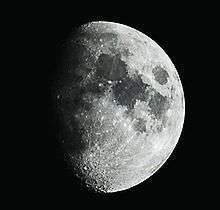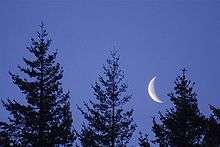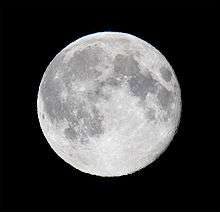Definify.com
Webster 1913 Edition
Moon
Moon
(moōn)
, Noun.
[OE.
mone
, AS. mōna
; akin to D. maan
, OS. & OHG. māno
, G. mond
, Icel. māni
, Dan. maane
, Sw. måne
, Goth. mēna
, Lith. menů
, L. mensis
month, Gr. μήνη
moon, μήν
month, Skr. mās
moon, month; prob. from a root meaning to measure (cf. Skr. mā
to measure), from its serving to measure the time. √271. Cf. Mete
to measure, Menses
, Monday
, Month
.] 1.
The celestial orb which revolves round the earth; the satellite of the earth; a secondary planet, whose light, borrowed from the sun, is reflected to the earth, and serves to dispel the darkness of night. The diameter of the moon is 2,160 miles, its mean distance from the earth is 240,000 miles, and its mass is one eightieth that of the earth. See
Lunar month
, under Month
. The crescent
moon
, the diadem of night. Cowper.
2.
A secondary planet, or satellite, revolving about any member of the solar system;
as, the
. moons
of Jupiter or Saturn3.
The time occupied by the moon in making one revolution in her orbit; a month;
as, it’s been many
. moons
since I last visited WashingtonShak.
4.
(Fort.)
A crescentlike outwork. See
Half-moon
. Moon blindness
. (a)
(Far.)
A kind of ophthalmia liable to recur at intervals of three or four weeks
. (b)
(Med.)
Hemeralopia.
– Moon dial
, a dial used to indicate time by moonlight.
– Moon face
, a round face like a full moon.
– Moon madness
, lunacy.
[Poetic]
– Moon month
, a lunar month.
– Moon trefoil
(Bot.)
, a shrubby species of medic (
– Medicago arborea
). See Medic
. Moon year
, a lunar year, consisting of lunar months, being sometimes twelve and sometimes thirteen.
– blue moon
, see
– blue moon
in the vocabulary. many moons
, a long time.
Moon
,Verb.
T.
[
imp. & p. p.
Mooned
; p. pr. & vb. n.
Mooning
.] 1.
To expose to the rays of the moon.
If they have it to be exceeding white indeed, they seethe it yet once more, after it hath been thus sunned and
mooned
. Holland.
Moon
,Verb.
I.
To act if moonstruck; to wander or gaze about in an abstracted manner.
Elsley was
mooning
down the river by himself. C. Kingsley.
Webster 1828 Edition
Moon
MOON
,Noun.
1.
The heavenly orb which revolves round the earth; a secondary planet or satellite of the earth, whose borrowed light is reflected to the earth and serves to dispel the darkness of night. Its mean distance from the earth is 60 1/2 semidiameters of the earth, or 240,000 miles. Its revolution round the earth in 27 days, 7 hours, 43 minutes, constitutes the lunar month.2.
A month. This is the sense in which rude nations use the name of the moon; as seven moons.Half-moon, in fortification, a figure resembling a crescent.
Definition 2026
Moon
Moon
English

The Moon's astronomical symbol

The Earth's moon.
Alternative forms
Proper noun
Moon
- The Earth's moon; the sole natural satellite of the Earth, represented in astronomy and astrology by ☾.
- (paganism) The god of the Moon in Heathenry.
- 1994, Tony Linsell, Anglo-Saxon Mythology, Migration & Magic, Anglo-Saxon Books, ISBN 1898281092, page 15:
- Moon, the companion of Night, waxes and wanes, and we call this time a month.
- (Can we date this quote?), Falcon Stow, An Anglo-Saxon Almanac, privately published, page 13:
- Moon's Day.
- 2005, Diana Paxson, Taking up the Runes, Weiser Books, ISBN 1578633257, page 328:
- Sun come, Moon come, Seed time, dry time, fog and rain, Sowing, growing, reaping, resting, Sun come, Moon come, etc.
-
- A surname.
Synonyms
Translations
sole natural satellite of the Earth
|
|
See also
Anagrams
moon
moon
English

The Moon (waning crescent)

The Moon (full)
Noun
moon (plural moons)
- (with "the") Earth's only natural satellite.
- Any natural satellite of a planet.
- the moons of Jupiter
- (literary) A month, particularly a lunar month.
- 1603, William Shakespeare, Othello:
- For since these arms of mine had seven years' pith,
Till now some nine moons wasted, they have used
Their dearest action in the tented field…
- For since these arms of mine had seven years' pith,
- 1737, John Brickell, The natural history of North-Carolina, page 308-309:
- They number their age by Moons or Winters, and say a Woman or a Man is so many Moons old, and so they do with all memorable Actions in life, accounting it to be so many Moons or Winters since such or such a thing happened. Note: in earlier modern English, many nouns were capitalized, similar to present day German.
- 1822, Thomas Love Peacock, Maid Marian, page 238:
- Many moons had waxed and waned when on the afternoon of a lovely summer day a lusty broad-boned knight was riding through the forest of Sherwood.
-
- A crescent-like outwork in a fortification.
Synonyms
- (Earth's largest natural satellite): Moon
- (natural satellite of a planet): satellite, natural satellite
- (month): calendar month, lunar month, month
- See also Wikisaurus:moon
Derived terms
Terms derived from moon
|
Translations
largest natural satellite of planet Earth
|
|
any substantially sized natural satellite of a planet
|
|
month
|
|
Verb
moon (third-person singular simple present moons, present participle mooning, simple past and past participle mooned)
- (transitive, colloquial) To display one's buttocks to, typically as a jest, insult, or protest.
- (intransitive, colloquial) (usually followed by over or after) To fuss over something adoringly; to be infatuated with someone.
- Sarah mooned over Sam's photograph for months.
- You've been mooning after her forever, why not just ask her out?
- To spend time idly, absent-mindedly.
- 1898, Joseph Conrad, Youth
- We were only three on board. The poor old skipper mooned in the cabin.
- 1898, Joseph Conrad, Youth
- (transitive) To expose to the rays of the Moon.
- Holland
- If they have it to be exceeding white indeed, they seethe it yet once more, after it hath been thus sunned and mooned.
- Holland
Translations
to display one's buttocks to
|
Related terms
- month
- moonsick
See also
-
 moon on Wikipedia.Wikipedia
moon on Wikipedia.Wikipedia
-
 natural satellite on Wikipedia.Wikipedia
natural satellite on Wikipedia.Wikipedia